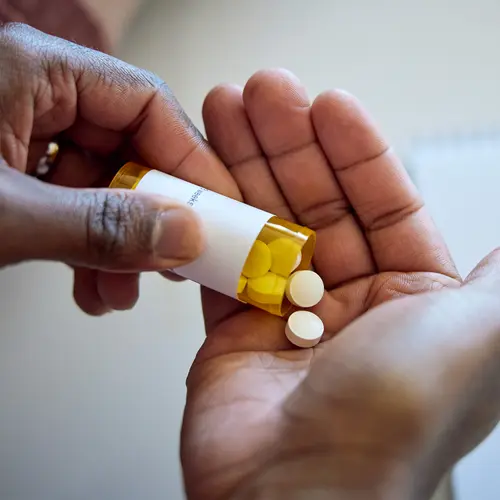Schizophrenia is a complicated mental illness that can be hard to treat. Antipsychotic drugs greatly improve symptoms for many people. But about a third of those with the condition have what’s called treatment-resistant schizophrenia (TRS).
Doctors consider schizophrenia treatment-resistant if:
- You see little improvement after trying at least two antipsychotic medications, each for 6 weeks or more at a time (and you took them as prescribed).
- Your symptoms are moderate to serious and interfere with your life.
Even if you don’t get better with traditional antipsychotics, there’s treatment that may help. You may be a candidate for clozapine (Clozaril, Versacloz), a so-called second-generation antipsychotic drug that often works for this condition.
Who’s at Risk for Treatment-Resistant Schizophrenia?
Studies show that those with TRS are more likely than others with schizophrenia to have:
- Symptoms at a young age
- Fewer periods of remission
- Untreated psychosis for a longer time
- Previous substance abuse
- A history of not sticking to their treatment plans
How Is Treatment-Resistant Schizophrenia Treated?
Clozapine is the only FDA-approved medication for treatment-resistant schizophrenia. It treats symptoms of psychosis like hallucinations and delusions. It also improves mood and behavior. You take it as a tablet or liquid. It works by rebalancing levels of dopamine and other chemicals in your brain.
If it works for you, it can be life-changing. It makes a major difference in your quality of life, reduces the chances that you’ll be hospitalized, and greatly reduces your risk of suicide.
But clozapine isn’t effective for 50%-60% of people with TRS. They can have active psychosis even with daily doses for up to 6 months.
Clozapine also may have side effects including:
- Low or high blood pressure
- Fast heartbeat
- Fever
- Dizziness or fainting
- Headache
- Drowsiness or sedation
- Constipation
- Nausea or vomiting
- Weight gain, which raises your risk for type 2 diabetes
It can also cause a serious side effect that decreases the number of white blood cells you have, making you more prone to infections. You can’t feel this, so you’ll need weekly blood tests to make sure you don’t get it. After you’ve been taking clozapine for a while, you may need those tests only every few weeks.
Other serious potential side effects include:
- Seizures
- Liver damage
- Myocarditis (swelling of your heart muscle)
- Cardiomyopathy (enlarged or thickened heart muscle)
Your doctor will probably start you on a low dose, and increase it gradually.
When your doctor prescribes clozapine:
- You must keep taking it to keep your symptoms from coming back.
- Tell your doctor about all medications you take, including herbs, supplements, and nonprescription drugs.
- Avoid alcohol and illicit drugs.
- Don’t drive if it makes you drowsy.
- Cigarettes can affect levels of clozapine in your blood. Tell your doctor if you smoke.
- Get medical help right away if you have extreme tiredness, trouble breathing, a rapid or irregular heartbeat, flu-like symptoms, chest pain, or fever.
It can also be a challenge for your doctor to know if clozapine is right for you. Sometimes it takes up to a year to know whether it’s working properly. And there are few other medications for TRS.
If clozapine isn’t working well after 6 months, your doctor may:
- Review your schizophrenia diagnosis to make sure it’s correct
- Check your dosage
- Make sure you’re taking your clozapine as prescribed
They may add another antipsychotic drug to the mix, such as risperidone (Risperdal) or aripiprazole (Abilify).
Some experts say that because of the blood tests and the possible side effects, doctors tend to under-prescribe clozapine. But delayed treatment may make it less likely that the drug will work for you.
When Clozapine Doesn’t Work
For TRS, there aren’t many well-tested treatments besides clozapine. But if you don’t respond well to it, your doctor could try adding electroconvulsive therapy (ECT) to your treatment plan.
In ECT, a doctor uses a device to pass mild electric currents through your brain, triggering a short seizure. This causes brain chemistry changes that can relieve symptoms of some mental illnesses. We need more research, but some studies found that ECT combined with clozapine helped control symptoms of psychosis.
If that’s not effective, your doctor might try adding other drugs, including:
- Lamotrigine, an anti-seizure medicine
- Topiramate, also a seizure medication
- Minocycline, an antibiotic with anti-inflammatory properties
But we also need more research into how well these drugs might work for TRS.
Your doctor could also try repetitive transcranial magnetic stimulation (rTMS) along with your clozapine treatment. In rTMS, doctors use an electromagnet to deliver repeated magnetic pulses that stimulate nerve cells in your brain. It’s not clear how effective it is for TRS, though.
Like most people with schizophrenia, those with TRS can likely benefit from psychotherapies such as cognitive behavioral therapy (CBT). This kind of therapy can help people with schizophrenia:
- Understand and manage their symptoms
- Improve their life and social skills
- Lower their risk of suicide attempts
There’s not much research into psychotherapy for treatment-resistant schizophrenia in particular. But some studies have shown that it may be helpful for certain symptoms.

